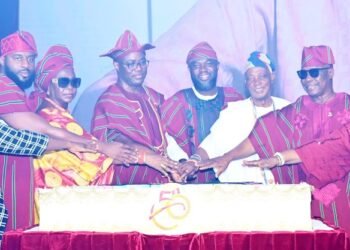President Bola Tinubu has been commended for bestowing a posthumous national award of Commander of the Order of the Niger (CON) on the late foremost female human rights activist, Hajia Sawaba Gambo.
Hajia Rashidat Folasade Abubakar gave the commendation in a press release on behalf of the entire family of the late fearless woman activist.
Until her death on 14 October, 2001 at the age of 68, Hajia Sawaba Gambo, throughout her lifetime, never shied away from a fight, particularly when it was on the side of the downtrodden.
Hajia Rashidat Folasade Abubakar, on behalf of the family, expressed heartfelt gratitude to President Tinubu “for honouring our beloved mother with the prestigious posthumous national award of Commander of the Order of the Niger (CON).”
She described the posthumous award and recognition as testament to the unwavering commitment and significant contributions of the late woman activist to the development of Nigeria’s democratic process.
“Hajia Gambo Sawaba was a trailblazer, a fierce advocate for social justice, and a champion for the rights of women and the marginalised.
“Her tireless efforts in promoting democracy and civic engagement have left an indelible mark on our nation’s history.
“This posthumous national award not only acknowledges her legacy but also serves as an inspiration for future generations to continue the fight for equality and justice,” Hajia Folasade Abubakar stated.
She added that the family was deeply moved by the recognition from the Federal Government and President Tinubu, noting that it reflected a commitment to honouring those who have dedicated their lives to the service of our great nation.
“It is our hope that this posthumous national award will encourage more Nigerians to engage in the democratic process and uphold the values for which our mother stood.
“Once again, we extend our sincere appreciation to President Bola Ahmed Tinubu and the National Awards Committee for this honour.
“We are proud to see the contributions of Hajia Sawaba Gambo celebrated in this manner, and we remain committed to carrying forward her legacy of service and advocacy,” she added.
Hajia Sawaba Gambo: Life Of A Renowned Woman Activist
Without any iota of doubt, Hajia Gambo Sawaba was the most jailed Nigerian female politician. She was a political activist who was publicly flogged, had her hair shaved off with a broken bottle and was imprisoned 16 times.
Born on 15 February, 1933, she has been rightly regarded as one of the most important female politician ever to come out of the Northern Nigeria.
She was reputed to be a young girl who, growing up in the 1940s and 40s, would always take up the fights of other children, mostly the losers, telling them: “I have bought this fight from you.”.
A Teenage Female Activist
She lost her father at the age of 10 in 1943, while her mother also passed on three years later. At the age of 13, Sawaba was married to a second world war veteran, Abubakar Dan Sarkin and she gave birth to her only child, Bilikisu, when she was 16 years old.
At the time, the British ruled over Nigeria using a system of Indirect Rule, whereby Native Authorities (NA) administered colonial policies in the 12 northern provinces through local emirs and district and village leaders.
The Northern Region was ruled by the conservative Northern Peoples’ Congress (NPC). But in 1950, a school teacher in Kano City, called Malam Aminu Kano, formed a new political party, Northern Elements Progressive Union (NEPU).
NEPU supported “women’s education in both religious and secular spheres and their being given enough space – politically and economically.”
The position of NEPU was in sharp contrast to the NPC, which controlled the Native Authorities and whose leadership was quoted as saying: “We in the North are happy, our women are happy about their condition.
“There is not a single northern woman who has told anyone that she is unhappy. We know what is right for women and our men know what is right for themselves.”
NEPU’s messages resonated with Sawaba’s sense of justice and she became an early member of the party’s women’s wing. She openly advocated against child marriage, forced and unpaid labour and unfair taxes, and canvassed for jobs for women, education for girls and full voting rights.
There were already calls for women’s voting rights in other parts of Nigeria – by the likes of the renowned feminists, Olufunmilayo Ransome-Kuti and Margaret Ekpo in the western and eastern regions of Nigeria, respectively. Sawaba would soon lend her voice to theirs.
In the course of time, Sawaba became synonymous with the politics of freedom and emancipation in Northern Nigeria, especially for women.
Naturally, she attracted the ire of the authorities. As many women in the North followed the practice of purdah, a form of social seclusion, Sawaba went from house-to-house to speak to them.
This displeased the Native Authority in Kano and, in 1952, Sawaba was arraigned before the Alkali (Magistrates) Court which sentenced her to a three-month imprisonment on charges of “drawing out women who were in purdah”.
Thus began the series of 16 prison sentences Sawaba Gambo served during her lifetime. The authorities in Kano ordered her to leave the city in the same 1952 and was escorted back to Zaria by local law enforcement agents.
But she continued her political activism – and periods of imprisonment – in Zaira and Kano, she was also imprisoned in Kaduna and Jos.
Through her fearless and oratorical prowess, she inspired countless women and some men who joined her cause to mobilise a cult-like followership, having earned their respect and admiration.
As a child, one noticeable trait about Sawaba was an unusual passion for people with mental problems. In her magnanimous manner, she reportedly often spoke with them, accommodated some and to some, she would give money, clothes and food.
Always fighting for others, Sawaba Gambo, the notable woman politician and human rights activist was quoted to have once said: “I could not stand by to watch a weak friend or relation being molested.”






























